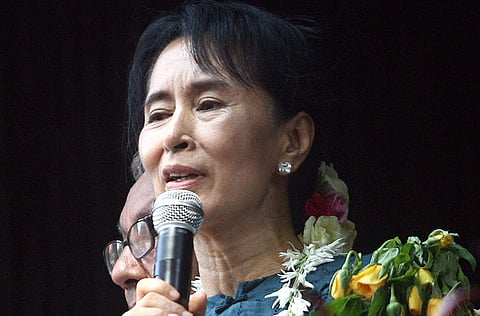Calling on Suu Kyi to speak for Rohingyas
Myanmar icon had better learn she cannot cherry pick when it comes to human rights

On Saturday, 11 August, I read in the UAE Arabic paper Abral Imarat (Across the Emirates) that Foreign Minister Shaikh Abdullah Bin Zayed Al Nahyan had written to relevant international bodies such as the United Nations about the catastrophic situation in which the Rohingya Muslims of Myanmar find themselves.
This is one of the most persecuted stateless groups in the world as identified by the UN. We have all read about the massacres that have taken place in the past few weeks, and have seen horrific pictures of naked or semi-naked bodies of male and female adults and children in long rows and huge piles, apparently being “cremated”, something not allowed by Islam, but apparently perpetrated by Myanmar Buddhists, of all people.
If confirmed, these would constitute serious crimes against humanity apparently committed while the world, including the government of Myanmar, looks the other way. I have seen commentary pointing out that Aung San Suu Kyi, the Burmese opposition leader, who recently received her Nobel peace prize, did not see fit to comment on such blatant atrocities. In Britain’s The Daily Telegraph, Alex Spilius reported that she was facing a backlash from fellow pro-democracy campaigners who were dismayed at her refusal to speak out against abuses being committed by her country’s military junta, who apparently wish to deport 800,000 Rohingya, across the border to Bangladesh, the pretext being that Bangladesh is a Muslim country. Bangladesh turned them back, claiming that the country was already too crowded with Bangladeshis.
Someone should remind Aung San Suu Kyi that she cannot cherry-pick when it comes to human rights, including those of Muslims, who make up 20 per cent of the world population. Indeed, her exalted iconic position in the world and local opinion dictates that she intervenes, regardless of the cost to her popularity among her own people.
We read that the atrocities were precipitated by rape committed by some Rohingya men. While this may be true, it could not be the sole cause; rather the final straw which came in the wake of chronic mistrust and animosity between the two groups. Whenever we scratch below the surface, we will always find that these ethnic and sectarian conflicts are due to competition for land and resources, both in short supply in these destitute and congested parts of the world.
In addition to the UN, and the EU, Shaikh Abdullah has also addressed the Secretary-General of the Organisation of the Islamic Conference (OIC). But how much can this body do? It certainly represents about a fifth of the population of the planet. It also harbours a significant portion of the oil reserves of the world. But, it also has a disproportionate share of the world’s corruption, illiteracy, morbidity and autocracy; factors that help make it a relatively dysfunctional and non-effectual body. Had that not been the case, one could imagine how much clout it would have, if and when it demands from the military dictators of Myanmar, respect of the human rights of its Muslim population. Is that interference in the internal affairs of Myanmar? Of course not; and Shaikh Abdullah did not think so. It is no more interference than when the United States insists on respect for the human rights of Copts in Egypt.
A recent episode in a Milwaukee Sikh temple, in the United States last week demonstrated how Muslims are regarded by others in the world — and it is not flattering. A white supremacist man murdered seven Sikhs at prayers in the temple. Why this is interesting in this context is that when the news of this tragic event broke, the Sikh leadership called it a “case of mistaken identity!”
We all know that male Sikhs grow their beards and wear turbans, and may thus be mistaken for Muslims. Indeed, in the aftermath of 9/11, at least one Sikh American man was murdered on the basis of such mistaken identity. However, it would be counterproductive if Sikh communities were to promote this idea, because white supremacists target a wide range of groups, which does not exclude Sikhs. Dissociating themselves from Muslims is not going to make them any safer because white supremacists are a danger to all of us, and it is in the interest of all of us to work together to fight all forms of racism and hatred worldwide.
I will always remember the story of a Jewish man, interrogated by a border security official at New York airport, immediately after 9/11. I wish I had kept the reference! The guard mistook him for an Arab, because of his Semitic appearance and his name — very easily done. He pulled him aside and the first question he asked him was “So, you read the Quran?” He answered that he did. It was because he was a scholar who did in fact read the Quran, as he read other holy books. This led to a series of probing aggressive questions, before the guard figured out that the man was a Jew. The writer said that he could easily have shortened the interrogation by divulging his Jewish identity, but chose not to, precisely because he did not want to dissociate himself from his fellow Muslim American citizens. What a remarkable man!
Dr Qais Ghanem is a retired neurologist, radio show host, poet and novelist. His two novels are Final Flight from Sana’a and Two Boys from Aden College. He lives in Canada.
Sign up for the Daily Briefing
Get the latest news and updates straight to your inbox



